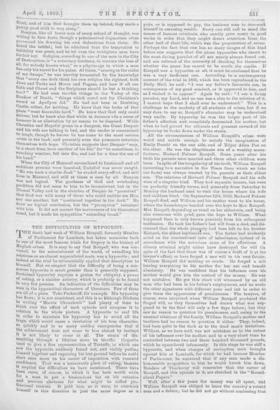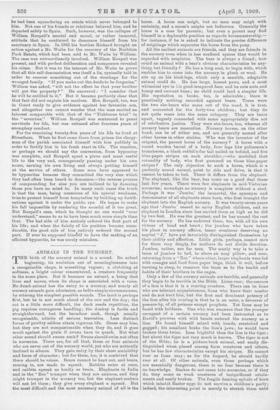THE DIFFICULTIES OF HYPOCRISY.
THE death last week of William Roupell, formerly Member of Parliament for Lambeth, has taken memories back to one of the most famous trials for forgery in the history of English crime. It is easy to say that Roupell, who was con- victed, to the astonishment of the world, of swindling his relations on an almost unparalleled scale, was a hypocrite ; and indeed at the trial be substantially applied that description to lannself. But we suspect that the difficulty of being a con- sistent hypocrite is much greater. than is generally supposed. Sustained hypocrisy requires a genius for obliquity, a power of acting, or a sinister artistry, which is probably to be found In very few pereions. An indication of the difficulties may be Been, in the hypocritical Characters of literature. Few of these are all of a piece. Take Pecksniff, for example. His hypocrisy has flaws; it is not consistent, and this is so ilthough Dickens 111 writing "Martin Chrtzzlowit " had plenty of time to think over the effect of each episode and compose it in relation to the whole picture. A hypocrite in rend life In order to maintain his hypocrisy has to avoid all the traps, which would Cause a revelation of his true character, SO quickly and in so many sudden emergencies that if the achievement does not ,come to him almost by instinct it is not likely to come at all. The strain of dins- Rambling .through a lifetime must be terrific. Coquelin used to give a fine representation of Tartuffe, in which one Raw the hypocrite suddenly found out, and visibly pulling himself together and regaining his lost ground before he could start once more on his career of imposition with renewed confidence. That was a memorable piece of acting, because it implied the difficulties we have mentioned. There have been cases, of course, in which it has been Worth while for a man to put a tremendous tart on his resource and nervous alertness for what might be called pro- fessional reasons. It paid him, as it NOVO, to overwork himself in this direction in just the same degree as it
pays, or is supposed to pity, the business man to overwork himself in amassing wealth. Every one will call to mind tine names of famous criminals ,who overtly grew weary in good works in order that they might divert attention from the other half of their life, which was the perpetration of crime.
Perhaps the fact that one has so many images of this kind before one suggests that the pious hypocrites who resort to the most daring paradox of all are nearly always fouud out, and are relieved of the necessity of deciding for themselves whether the game has ceased to be worth the candle. If Roupell was it hypocrite at all, it must he confessed that he was a very inefficient one. According to a contemporary account of tine trial in 1862, which has been reproduced in the Daily Mail, he said: "I was my father's favourite son, in consequence of rny good conduct, as it appeared to him, and as I wished it to appear." Again he said : "I am paradox, my Lord, and no one has a clue to the solution of it.
I cannot hope that I shall ever be understood." This is a challenge to the modesty of all students of crime, but if we may dare to say eir, Roupell's character truly be understood very easily. By hypocrisy he won the larger part of his father's affection and completely dominated his mother, but when he had gained the ultimate and greatest reward of his hypocrisy he broke down under the strain.
All the circumstances of William Roupell's crime wei.a weird and subtle enough to satisfy the imagination of Emily Brontë on the one side, and of Edgar Allan Poe on the other. He was the illegitimate eon of a wealthy manu- facturer, Richard Palmer Roupell. Some years after his birth his parents were married and three other children were born. In spite of the irregularity of his birth, William Reopen (according to a narrative in the Times from which we take our facts) was always treated by his parents as their eldest son. The relations of Richard Palmer Ronpoll and his wife were of a singular kind. They bad separate houses, but were Ott perfectly friendly terms, and generally from Saturday to Monday the husband used to visit the house where his wife and children lived. On September 120,1856, Richard Palmer Roupell died, and William and his mother Went to his house, where tine housekeeper handed over tine keys to Mrs. Roupell.
n011pen, depending as usual on her eldest son, and being
also overcome with grief, gave the keys to William. What happened then is only known precisely from his subsequent confession. He took his father's last will from a desk and die- covered that the whole propsrty had been left to his brother Richard, the eldest legitimate son. The father had evidently acted on the conventional laws of inheritance, instead of in accordance with the notorious state of his affections. A clumsy criminal might either have destroyed the will (in spite of the fact that there was of course a draft of it at the lawyer's office), or have forged a new will in his own favour. William Roupell did nothing, so crude. He forged a will leaving everything to his mother for her use and benefit absolutely. He was confident that his influence over his mother would give him the control of the. money. He War; not mistaken. He got this short will witnessed by an old man who bad been in his father's employment, and he wrote the other signatures with different pens and ink in order to give them the appearance of genuineness. The lawyers, of course, were surprised when William Roupell produced the forged will, as they themselves had drawn what was sup- posed to be the final will only a few days before; but they saw no reason to question its genuineness, and, owing to the unusual relations of the family, William Roupell's mother and brothers had no reason to question it either. They, indeed, had been quite in the dark as to the dead man's intentions. William, as we have said, was not mistaken as to the extent of his influence over his mother, and in a very short tune he controlled between two and three hundred thousand pounds, which he squandered infamously. In this stage he was still a hypocrite, and when charges of corruption were brought against him at Lambeth, for which he had become Member of Parliament, be answered that if any man made a dis- honourable proposition to him he would knock him down. Readers of Thackeray will remember that the career Of Roupell, and this episode in it, are sketched in the "Round- about Papers."
Well, after a few years the money was all Spent, and Ronpoll was obliged to leave the country a ruined man and a debtor; but he did not go without confessing that
he had been squandering an estate which never belonged to him. Not one of his friends or relations believed him, and he departed safely to Spain. Such, however, was the collapse of William Roupell's mental and moral, or rather immoral, attitude that he continued to denounce himself from his sanctuary in Spain. In 1862 his brother Richard brought an action against a Mr. Waite for the recovery of the Norhiton Park Estate, which had been sold to Mr. Waite by William. The case was extraordinarily involved. William Roupell was present, and with perfect deliberation and composure revealed his crime. But it was to the interest of Mr. Waite to prove that all this self-denunciation was itself a lie, cynically told in order to recover something out of the wreckage for the wronged family. "If you make out the deeds to be forgeries," William was asked, "will not the effect be that your brother will get the property P" He answered : "I consider that he will be entitled to it." But it became perfectly clear that that fact did not explain his motives. Mrs. Roupell, too, was in Court ready to give evidence against her favourite son, and altogether one cannot wonder that the case excited an interest comparable with that of the " Tichborne trial" in the "seventies," William Roupell was sentenced to penal servitude for life, but was released after fourteen years of exemplary conduct.
For the remaining twenty-five years of his life he lived at Streatham. When he first came there from prison the clergy- man of the parish associated himself with him publicly in order to fortify him in his fresh start in life. The reaction, or perhaps we should say the conversion, from hypocrisy was complete, and Roupell spent a pious and most useful life to the very end, courageously passing under his own name, earning his own living and always putting himself at the service of others. Some men have appeared to be hypocrites because they committed the very sins which they had often been beard to denounce,—the reverse process of compounding for sins you are inclined to by damning those you have no mind to. In many such cases the truth is that the man, being conscious of his special weakness, tries to protect himself from temptation by building up fortifi- cations against it under the public eye. He hopes to make his fall impossible by rendering the scandal of it too great; But Roupell's case, which he thought no one would "ever understand," seems to us to have been much more simple than that. The bad side of him entirely ordered the first part of his life; and when the falsity of his position became linen- durable, the good side of him entirely ordered the second part. If ever he supposed himaelf to have the making of an efficient hypocrite, he was surely mistaken.











































 Previous page
Previous page